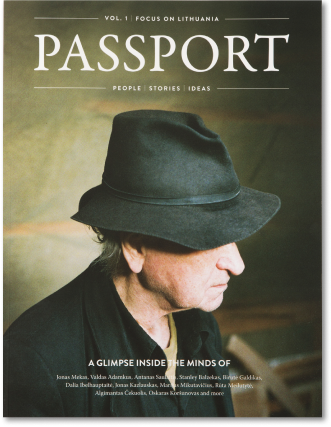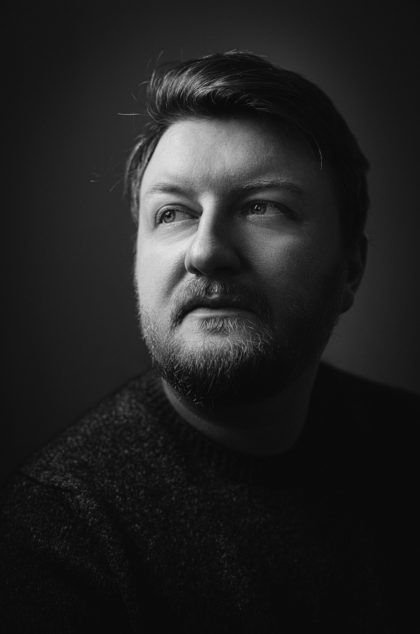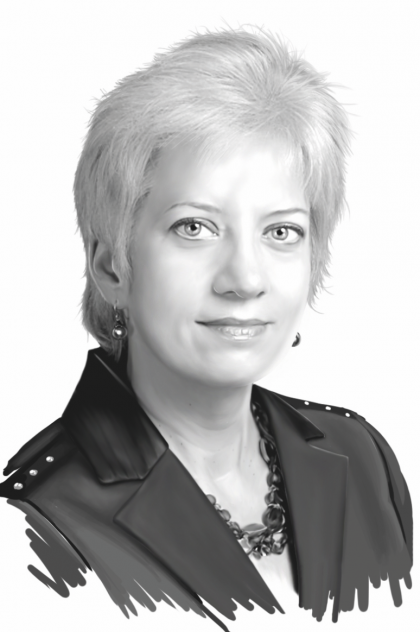Vytaras Radzevičius
Journalist, traveler, TV producer and screenwriter

The western edge of the Sahara: We have almost crossed the desert. Stagnant heat rises from the ground, and sitting on the sand next to us are two dignified Bedouins. We give them a few bottles of water—we’ll get fresh water soon, while they will stay to defend and protect their herd of camels. In a sort of unwritten custom, the Bedouins quietly thank us and, perhaps just out of politeness, ask us where we’re from. We try to ask our guide Ahmed to explain, but we don’t speak French and they don’t speak English, so we simply unroll a map of the world. The Bedouins look surprised; they excitedly discuss something with each other, and then, in words even we can understand, they tell us: “Your country—very far…even past the Sahara.”
How many people on the planet know where Lithuania is located?
Vytaras Radzevičius
A few weeks before our meeting with the Bedouins in the Sahara, a young man in Marrakesh saw my yellow Lithuanian soccer jersey. Surprisingly, he did not mistake it for a Brazilian uniform. The little Moroccan blurted out: “Lithuania, Žydrūnas Savickas, The Strongest Man in the World!”
Lithuanians love the Grateful Dead rock band. When we kicked down the oppressive gates of the Soviet Union and went forth into the free world, the Grateful Dead—through sales of their yellow, green, and red tie-dyed and skeleton-adorned shirts—gathered funds for the Lithuanian basketball team to participate during the first post-occupation Olympic Games in Barcelona. In 1992, this “Grateful Dead” team faced the USA Dream Team, and even today, if an American sees you wearing this t-shirt, he’ll tap you on the shoulder and say, “You’re Lithuanian! We know your history and we like the Grateful Dead, too!” Then, all that’s left is to repeat the old saying, “Better dead than red!”
Once, while waiting for the Old Faithful geyser to erupt at Yellowstone National Park, a colleague and I casually discussed the rigid schedule of this natural phenomenon. An American, standing close to us and listening to our foreign language, came up and asked, “Guys, is there any chance you’re Lithuanian?” When his attentiveness was rewarded, he was overjoyed. “I’m from Portland, so I know all about Arvydas Sabonis!” he exclaimed. It turns out that people from Portland still warmly remember the days when the Lithuanian mega-star, Sabonis, played for their NBA team.
China is massive, and most cities in the country have a bigger population than all of Lithuania, so why should they know our name? But yet again…sports prevail. Traveling there, we are reminded that Jonas Kazlauskas used to be the basketball team’s head coach. The locals beam and say his name in their own way, “Jonasy Kazlauskasy,” adding a special ending to make it their own. It turned out that Kazlauskas had followed a legacy of Lithuanians in China. In Shanghai before World War II, there was a small colony of Lithuanians in the French zone, complete with a Lithuanian shop, bakery, and even Lithuanian policemen.
Argentines do not want to remember the 1999 Buenos Aires soccer match against Lithuania that ended in a tie. Before the match, local commentators were laughing because they couldn’t pronounce the names of the visiting players and didn’t take them seriously. At the end of the match, however, the elite Argentineans were unable to win decisively against these Lithuanian soccer “outsiders,” a fact that still makes the machos there grimace. In traveling there, we found that the countries share a common history. In the middle of Argentina lies a small town, founded by Lithuanian and Welsh families, by the name of Sarmiento. You’ll see a Lithuanian monument to Kupiškis native Casimir Šlapelis, whom the Argentines dubbed “El Abuelo del Aire” (Grandfather of the Air). He is remembered in part for flying his plane El Chimango (The Hawk/Vanagas) at the ripe old age of 82, though this is but a small detail in the life of an extraordinary man.
Central Asia. In the middle of Tashkent, there stands a Catholic Church known locally as the “Polish Church,” because Polish priests reside there now. It was originally built, however, by a Lithuanian priest named Justinas Bonaventūra Pranaitis in the beginning of the twentieth century. Using money earned from sawmills, he was able to build several churches in Turkestan. As the story goes, the priest died under mysterious circumstances and was buried in his church’s graveyard, but the Bolsheviks later desecrated and destroyed his grave, so his burial place is now unknown. The Bolsheviks left many graves this way…
In Lutsk, Western Ukraine, there is a restaurant named Korona Vitovta (Crown of Vytautas) near the Liubartas Castle where Vytautas the Great attempted coronation. According to historians, the castle still stands only due to a lucky coincidence: the bricks are of non-standard size, which means they could not be stripped and resold for profit. It is now the only castle from the Grand Duchy of Lithuania that has not been rebuilt in any way, so the Ukrainians are now charged with protecting this Lithuanian memory.
During one of my first trips abroad, still during the Soviet period, I went hiking in Bulgaria. I was still a student, and to this day I regret that I didn’t record one interview held in Plovdiv. In a small bistro with my future wife and me, sat two gray-haired men. They heard us speaking a foreign tongue and asked where we were from. When we answered that we were from Lithuania, they lit up with joy. They told us that they had visited our country when it was still unoccupied by the Soviets and when Czechoslovakia was still united before the Munich conspiracy. It turned out that the two of them used to be arms suppliers, and the Lithuanian army had bought weapons from Czechoslovakia then.
Even while walking in Southeast Asia, our cameraman met a German who claimed to be the great grandson of Lithuanian King Mindaugas II.
Vytaras Radzevičius
Interestingly enough, I don’t think he was lying. How else would a German know that when Lithuania was to become a monarchy in 1918, they invited Wilhelm von Urach, the second Duke of Urach, to become Lithuania’s king?
So herein lies the paradox—Lithuania may be one of the least known countries in Europe, but it is actually known all around the world. Unfortunately, for some of my peers in the free world, Lithuania is still an unknown nation. I hope the time will come when these blind spots disappear from our world’s geography, and I hope new ones simply never appear.





